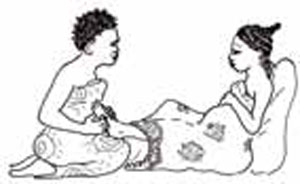Postpartum 'blues' and postpartum depression

Hormone changes are thought to be the cause of postpartum blues, a mild, transient, self-limiting disorder (it resolves on its own), which commonly arises during the first few days after delivery, and lasts up to two weeks. It is characterised by bouts of sadness, crying, anxiety, irritation, restlessness, mood swings, headache, confusion, forgetfulness, and insomnia. It rarely has much effect on the woman's ability to function, or care for her baby. Providing loving support, care and education has been shown to have a positive effect on recovery.
But if a women develops a serious postpartum depression (persistent sadness, low mood, difficulty in finding motivation to do anything), it will greatly affect her ability to complete the normal activities associated with daily living. Cases of depression need attention from trained mental health professionals for supportive care and reassurance, so refer the woman as soon as you can. The role of the patient's family is also very important in the course of treatment. Women with high levels of depression are less likely to initiate breastfeeding soon after the birth, and their babies are more likely to have episodes of illness such as diarrhoea.
Can you suggest why the baby might be affected in this way?
If two or more of the following symptoms occur during the first two weeks of the puerperium, refer the mother:
- Inappropriate guilt or negative feelings towards herself
- Cries easily
- Decreased interest or pleasure
- Feels tired and agitated all the time
- Disturbed sleep, sleeping too much or sleeping too little
- Diminished ability to think or concentrate
- Marked loss of appetite.
There may also be episodes of postpartum psychosis, marked by delusions or hallucinations – seeing or believing things that are not real.